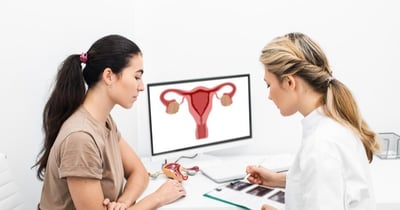Risk Reducing Salpingectomy With Delayed Oophorectomy as an Alternative to Risk- Reducing Salpingo-oophorectomy in High-Risk Women (TUBA/WISP II)

Prevention
Prevention study for women at high risk for ovarian cancer
Clinicaltrials.gov identifier:NCT05287451
Study Contact Information:
Contact: Roni Wilke, MD
by phone: (713) 822-4502
or by email: [email protected]
About the Study
This study is looking at whether removal of the () followed by removal of the ovaries () at a later date closer to the time of natural menopause may reduce the risk of ovarian cancer nearly as much as removing both the ovaries and at the same time (salpingo-oophorectomy) among women with an inherited , , , or mutation. Removing the only first and the ovaries at a later time closer to natural menopause may lessen menopausal symptoms while still lowering the risk for ovarian cancer.
This Study is Open To:
Women are eligible if they:
Are premenopausal with a documented in one of the genes listed below. Eligible age depends on gene mutation.
- BRCA1: 25-40
- BRCA2: 25-45
- BRIP1: 30-50
- RAD51C: 30-50
- RAD51D: 30-50
Have at least one
Do not wish to be pregnant in the future
This Study is NOT Open To:
Women cannot participate if they:
- are post-menopausal (either naturally or due to cancer treatment)
- wish for second removal of ovaries within 2 years of removing
- have a personal history of ovarian/fallopian tube or peritoneal cancer
- have had prior removal of the ()
What the Study Involves
Participants in this study will enroll in one of two groups. Participants will choose which group they enroll in based on their surgical preference.
- Group 1 will include women who choose risk-reducing removal of () with delayed .
- Group 2 will include women who choose removal of both and ovaries at the same time, (salpingo-oophorectomy) which is considered standard-of-care.
Study Contact Information:
Contact: Roni Wilke, MD
by phone: (713) 822-4502
or by email: [email protected]
Locations:
Massachusetts
City: Boston RECRUITING
Facility: Dana Farber Cancer Institute
Contact Info:
[email protected]
Colleen Feltmate
Minnesota
City: Rochester RECRUITING
Facility: Mayo Clinic
Contact Info:
[email protected]
Jamie N Bakkum-Gamez, MD
Missouri
City: St Louis RECRUITING
Facility: WU St Louis
Contact Info:
Andrea Hagemann, MD
New York
City: New York RECRUITING
Facility: Mount Sinai Health System
Contact Info:
[email protected]
Stephanie Blank, MD
City: New York RECRUITING
Facility: Memorial Sloan Kettering Cancer Center
Contact Info:
[email protected]
Kara Long-Roche, MD
Pennsylvania
City: Philadelphia RECRUITING
Facility: University of Pennsylvania
Contact Info:
[email protected]
Sarah Kim, MD
Texas
City: Houston RECRUITING
Facility: Lyndon Baines Johnson General
Contact Info:
[email protected]
Roni Wilke, MD
City: Houston RECRUITING
Facility: M D Anderson Cancer Center
Contact Info:
[email protected]
713-822-4502
Washington
City: Seattle RECRUITING
Facility: University of Washington
Contact Info:
[email protected]
Barbara Norquist, MD
Prevention
Prevention study for women at high risk for ovarian cancer
Clinicaltrials.gov identifier:NCT05287451
Study Contact Information:
Contact: Roni Wilke, MD
by phone: (713) 822-4502
or by email: [email protected]